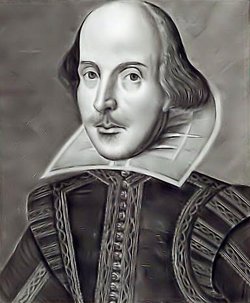William Shakespeare
William Shakespeare was a noteworthy English poet and playwright (1564 - 1616). Shakespeare is famous for the many great plays that he has written, including Macbeth, A Midsummer Night's Dream, Othello, Romeo and Juliet, Hamlet, King Lear, The Tempest, and more. The Manhattan Clan discovered his works not long after their awakening - and have also encountered a number of his characters, such as Macbeth, the Weird Sisters, Oberon, Titania, and Puck.
Shakespeare was good friends with Macbeth, although he did not know Macbeth's true identity. [1] Shakespeare and Macbeth probably had tea together at Into the Mystic in London or were drinking buddies. [2][3] Macbeth was amused by his friend's take on his life story, rather than offended. [4]
Other characters from his plays known to exist are Queen Mab, Prospero, Ariel, and Caliban. [5][6] Tamora has also been called a "Gargoyles character in the making". [7]
Appearances
- "Enter Macbeth" (Mentioned Only)
- "A Lighthouse in the Sea of Time" (Mentioned Only)
- "The Mirror" (Mentioned Only)
- "Render Unto Caesar" (Mentioned Only)
Real World Background
Shakespearean references in the Gargoyles Universe are common, thanks to Greg Weisman's fondness for the Bard. Not only have Macbeth, the Weird Sisters, Oberon, Titania, and Puck appeared directly in the series, but a few other characters are parallels to Shakespearean figures, such as the Coldtrio to Othello, Desdemona, and Iago or Dingo in Gargoyles: Bad Guys to Prince Hal. "Strangled" and "Losers" introduced modern-day namesake counterparts to Falstaff and his circle into the Gargoyles Universe. One of the female gargoyles on Avalon bears the name Ophelia, and a number of Shakespearean lines have been quoted or adapted in the course of the series.
Greg also planned to reflect Shakespeare in future episodes, not only through the introduction of Queen Mab and Prospero, but also by making Terry and Sphinx a parallel to Romeo and Juliet in the The New Olympians spin-off. He even once suggested a two-parter where the characters were trapped in a live performance of Macbeth, with Macbeth playing his namesake, Demona as Lady Macbeth, Goliath as Macduff, Elisa as Lady Macduff, and Hudson as Duncan (the higher-ups at Disney rejected it as a two-parter, and Greg felt the story would never fit into a single episode).
Shakespearean allusions in Gargoyles
- "Enter Macbeth" - Macbeth is introduced, and Brooklyn and Lexington recognize his name from the Shakespeare play (which Goliath had already read, but they had not).
- "Legion" - The future Coldfire and Coldsteel are called "Desdemona" and "Iago" in the voice credits.
- "A Lighthouse in the Sea of Time" - Macbeth's henchmen are called "Banquo" and "Fleance" in the voice credits. Jeffrey Robbins recognizes Macbeth's alias, Lennox Macduff, as an allusion to Macbeth.
- "The Mirror" - Puck is introduced, Oberon and Titania are first mentioned, and Brooklyn and Elisa both mention A Midsummer Night's Dream.
- "City of Stone" - The Weird Sisters are introduced in "City of Stone" Part One. In their encounter with Macbeth and Duncan in "City of Stone" Part Three, they say "Double, double, toil and trouble/ Fire burn and cauldron bubble", and greet Macbeth and Duncan with the words "All hail [Duncan/Macbeth], King of Scotland, and father of the king hereafter!" At Macbeth and Gruoch's wedding, Bodhe introduces them as "Lord and Lady Macbeth". One of Duncan's henchmen is named "Macduff" in the voice credits.
- "High Noon" - Lexington uses the names "Othello", "Desdemona", and "Iago" as password attempts when trying to re-activate Coldstone.
- "Heritage" - Elisa adapts the line "There are more things in heaven and earth..." from Hamlet, when speaking to Natsilane.
- "Ill Met By Moonlight" - Oberon and Titania (as Titania) first appear. Ophelia is first named. Oberon's line "The game is afoot" comes from the "Once more unto the breach" speech from Henry V (via Sherlock Holmes). At the end of the episode, Goliath says "All's well that ends well, then." The episode title is a quote from A Midsummer Night's Dream.
- "Future Tense" - The Xanatos Program adapts the line "Alas, poor Yorick" from Hamlet.
- "The Gathering" Part Two - Oberon says that when the humans in Manhattan awake the morning after his assault upon the Eyrie Building, the strange events from the previous night will seem to them only "a midsummer night's dream".
- "The Journey" - Broadway and Brooklyn both quote from Romeo and Juliet ("But soft, what light..." and "Parting is such sweet sorrow") in the library scene.
- "The Gate" - Kenneth III/the Grim says "Welcome every man according to his station, and who shall 'scape whipping?", based on a line from Hamlet.
- "Strangers" - Dingo's real name is revealed to be "Harry Monmouth", a nickname of Prince Hal/Henry V.
- "Strangled" - Falstaff, Mistress Quickly, Mistress Doll, Bardolph, Points, and Pistol are introduced. In addition, the events of the Redemption Squad infiltrating Eastcheap Isle throughout the Bad Guys miniseries took place the night of January 5th, 1997, a.k.a. Twelfth Night. [8]
- "Everywhere" - Demona mutters to herself "Heavy is the head" when observing Brooklyn with the Tracking Spell, slightly misquoting Henry IV, Part 2 ("Uneasy lies the head that wears a crown").
See Also
- William Shakespeare at Wikipedia, the Free Encyclopedia
